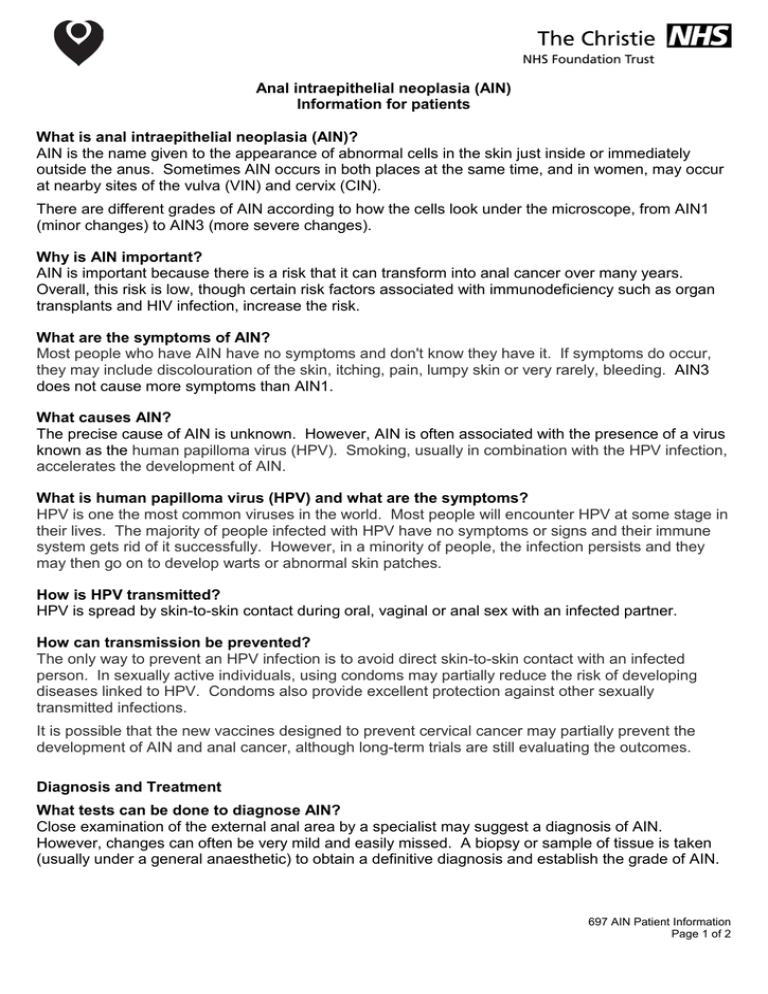Anal intraepithelial neoplasia (AIN)
advertisement

Anal intraepithelial neoplasia (AIN) Information for patients What is anal intraepithelial neoplasia (AIN)? AIN is the name given to the appearance of abnormal cells in the skin just inside or immediately outside the anus. Sometimes AIN occurs in both places at the same time, and in women, may occur at nearby sites of the vulva (VIN) and cervix (CIN). There are different grades of AIN according to how the cells look under the microscope, from AIN1 (minor changes) to AIN3 (more severe changes). Why is AIN important? AIN is important because there is a risk that it can transform into anal cancer over many years. Overall, this risk is low, though certain risk factors associated with immunodeficiency such as organ transplants and HIV infection, increase the risk. What are the symptoms of AIN? Most people who have AIN have no symptoms and don't know they have it. If symptoms do occur, they may include discolouration of the skin, itching, pain, lumpy skin or very rarely, bleeding. AIN3 does not cause more symptoms than AIN1. What causes AIN? The precise cause of AIN is unknown. However, AIN is often associated with the presence of a virus known as the human papilloma virus (HPV). Smoking, usually in combination with the HPV infection, accelerates the development of AIN. What is human papilloma virus (HPV) and what are the symptoms? HPV is one the most common viruses in the world. Most people will encounter HPV at some stage in their lives. The majority of people infected with HPV have no symptoms or signs and their immune system gets rid of it successfully. However, in a minority of people, the infection persists and they may then go on to develop warts or abnormal skin patches. How is HPV transmitted? HPV is spread by skin-to-skin contact during oral, vaginal or anal sex with an infected partner. How can transmission be prevented? The only way to prevent an HPV infection is to avoid direct skin-to-skin contact with an infected person. In sexually active individuals, using condoms may partially reduce the risk of developing diseases linked to HPV. Condoms also provide excellent protection against other sexually transmitted infections. It is possible that the new vaccines designed to prevent cervical cancer may partially prevent the development of AIN and anal cancer, although long-term trials are still evaluating the outcomes. Diagnosis and Treatment What tests can be done to diagnose AIN? Close examination of the external anal area by a specialist may suggest a diagnosis of AIN. However, changes can often be very mild and easily missed. A biopsy or sample of tissue is taken (usually under a general anaesthetic) to obtain a definitive diagnosis and establish the grade of AIN. 697 AIN Patient Information Page 1 of 2 Some specialists use an anal smear (the ‘Pap’ smear) test or look at the anal skin with a highresolution visual instrument (an anoscopy). However, these methods are not commonly used and we are not certain how effective they are. How is AIN treated? If you have AIN, it is important that you discuss the matter with your specialist. The body can completely heal itself from AIN, particularly AIN1, so it may be appropriate to monitor you regularly. The most commonly used treatments are: surgical removal, laser or diathermy*. In a few cases, a specialist may prescribe skin ointments such as 5-flourouracil cream. Currently, we do not know whether these treatments prevent the development of anal cancer. *diathermy – high-frequency electromagnetic currents are used to generate local heat in body tissues to destroy abnormal cells. What should I expect after treatment? If you have AIN3, close follow-up will be recommended with careful clinical examination at intervals of approximately 6 months over many years. If the specialist has concerns at these examinations, you may need further biopsies. Other advice Smoking cessation Smoking makes cell changes happen more quickly, so we advise you to stop smoking. • • • A FREE smoking cessation service is available for all patients at The Christie. Contact the Smoking Cessation Therapists on 0161 446 8236. Macmillan Cancer Support can advise on complementary services nationwide 0808 808 00 00 QUIT(smokers’ quitline provides support and advice) – 0800 00 22 00. Cervical cancer screening in women In many women with AIN, there is a link with abnormalities of the cervix. We recommend regular cervical screening. High risk patient groups HIV and immuno-compromised patients Patients who are immuno-compromised are at increased risk of the development of AIN, and when it occurs, the AIN to anal cancer process may speed up. These groups include: • • • • • HIV-positive patients Men who have sex with men, HIV-negative Renal (kidney) transplant patients Cardiac (heart) transplant patients Patients on long-term immuno-suppressants These patients may need closer and more frequent follow-up. They should discuss their case with the specialist. Further information The British Society for Colposcopy and Cervical Pathology Provides information on cervical screening and HPV. Frequently asked questions and guidance. Tel: 0121 607 4716 http://www.bsccp.org.uk Smokefree NHS support and advice service to help stop smoking Tel: 0800 022 4322 http://smokefree.nhs.uk/ The Christie Patient Information Service June 2014 CHR/GI/697/21.10.09 Version 2 Review June 2017 Details of the sources used are available, please contact Patient.Information@christie.nhs.uk 697 AIN Patient Information Page 2 of 2




